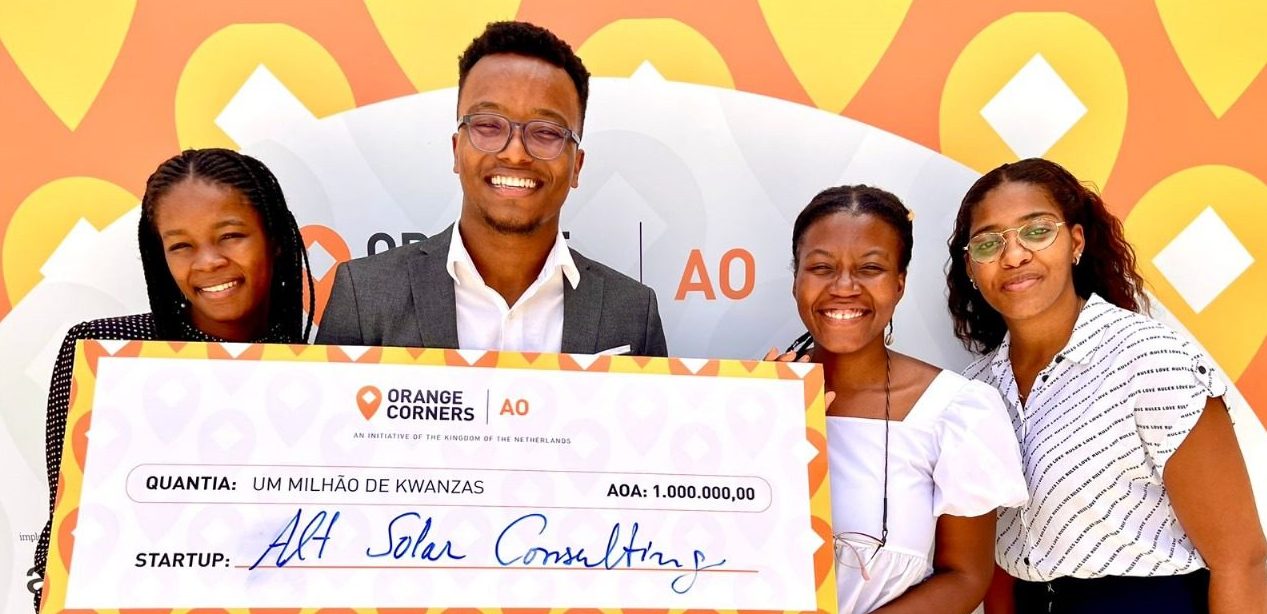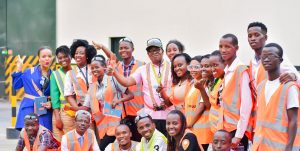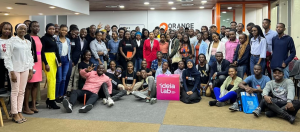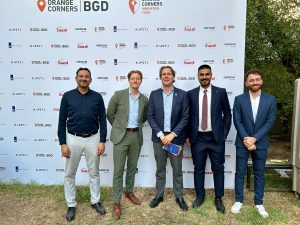Two remarkable women at the forefront of driving positive change in Angola. Swelia da Silva Antonio (Embassy of the Netherlands in Angola) and Carmen Mateia (Acelera Angola) are dedicated to nurturing entrepreneurship and innovation in Angola through Orange Corners. Together, they’re instrumental in shaping the entrepreneurial landscape of the country. Today, we delve deeper into what motivates these two inspiring women, exploring the driving forces in their lives and their shared commitment to the Orange Corners Angola programme.
Let’s start with a round of introductions! Who are you and what do you do for a living?
Swelia: my name is Swelia da Silva Antonio, I’m 26 years old and I live in Luanda, Angola. I’ve been here for about two years now, and since March 2024 I’ve been working as an Economic Officer at the Embassy of the Kingdom of the Netherlands in Luanda. When I was living in the Netherlands, I always wanted to go back to my country of birth to contribute to its development and share my knowledge and experiences gained abroad for positive change. I found my way back to Angola through beauty pageants, since I had a small track record in this field in the Netherlands. To be able to stay in Angola, I had to win the beauty pageant. Fortunately, I won the Miss Angola Universe beauty pageant 2022.
My first year in Angola I spent executing my mandate as Miss Universe Angola, representing my country on the international stage. Beauty pageants today encompass much more than the representation of what beauty entails, which in itself is diverse, subjective and highly cultural. My work also touched upon other subjects that are important to me, such as education. This changed the course of my life and defines who I am today: I’m a woman, I’m black, I’m young and I’m ambitious. I wasn’t only a migrant in the Netherlands, I’m considered a migrant here as well for having lived outside the country for so long. I’m very proud of this intersectional background, and I bring it to the table wherever I am and in every atmosphere that I operate. I believe this is an asset and it can inspire others to be fully themselves and excel in their unique and authentic being.

Carmen: I’m Carmen Mateia, I’m 25 years old and I’m from Benguela. I like to say that, because I really love the place I was born. I was raised between two counties, Benguela and Cunene. My parents still live there. Besides being a product owner at Acelera Angola, the implementing partner for Orange Corners Angola, I’m a human rights activist. In a way, I’ve always been a human rights activist. I started my work with young people associations as a girl scout. And I was always collaborating with NGOs and young people associations, especially during the weekends. When I was studying Portuguese linguistics at the college, I discovered that I could be an activist through writing.
Everything changed in my life two times really. In 2019, I won the Young African Leaders Initiative scholarship, and I went to South Africa to study civic leadership. That’s where I found out there were people doing professionally what I was already doing during the weekends: work in activism, with NGOs. So when I went back to Angola, I started working for a human rights NGO. I asked them for a six-month unpaid internship, but they said “no, you should be working here because of all your experience!”
The second defining moment was when UNICEF invited me to Kenya for advocacy training. That’s where I discovered that activism without advocacy is just entertainment. As activists, we should also incorporate advocacy. We should sit with the government, set up meetings. Activism isn’t just going to the street, but also about what happens afterwards. What happens in three months, one year because you went to the street.
I’m your go to person if you want to help young people in Angola, because I know almost all young people initiatives here and what they need. Especially in the south of Angola. Most weekends I travel there to help them, teach them especially about the advocacy part. A lot of young people in Angola start initiatives, but these die after five months or a year. But it isn’t just about creating initiatives, it’s also about managing them!
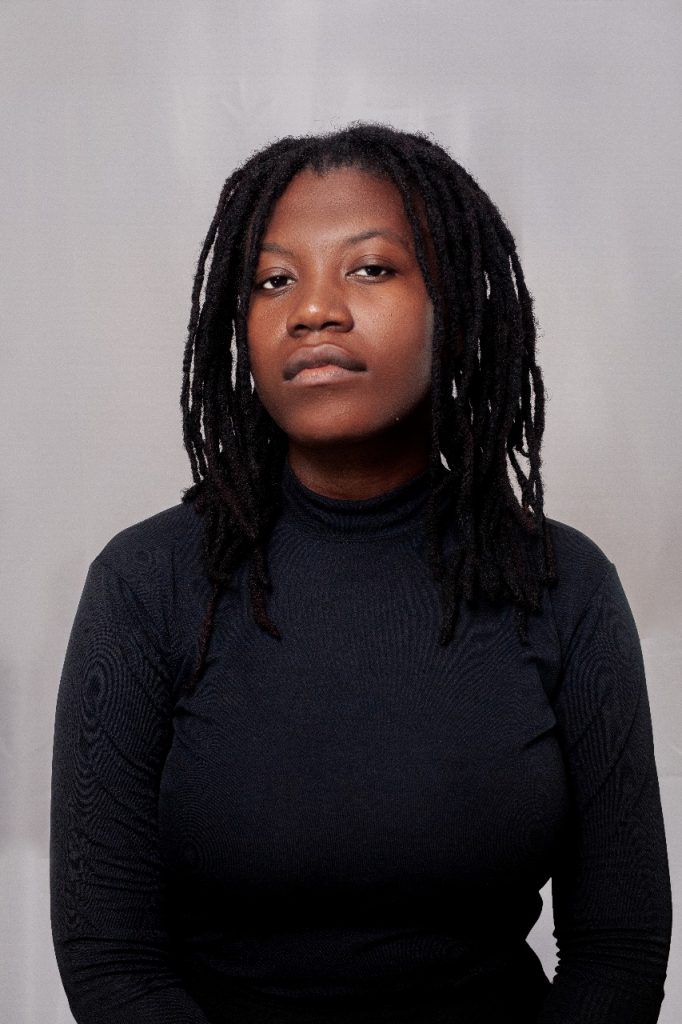
Both of you focus on youth. For those not familiar with Angola: why is this focus on youth so important, and what are the main challenges young people in Angola face today?
Swelia: I believe it’s important to focus on the youth because in the end we are the future, we are tomorrow. If we don’t invest in young people, then we can’t expect them to become outstanding citizens. So we should look at children from the ground up, already starting with education: teaching them about their rights, about the chances they have. So we can equip them for the world we’re living in. Because it’s quite a hard world!
Angola is a society with a demographic in the shape of a pyramid. That means we have a lot of young people, and every effort in society should be focused on this youth. This group needs to be assisted in whatever their endeavors are, because they need raison d’être. They need a vision and they need opportunities to make that vision come alive. Without that, they’re just living zombies who easily fall for trouble.
The struggles of this country are many, although many other countries deal with the same things. The unemployment rate is huge, for example. And there’s so much improvement possible in the educational system, and so many children remain outside of it. Currently the teachers are on strike again, as happens regularly. So much of the time that children should be having quality education they’re not. They don’t receive quality education, and the breaks are incredibly long. Children shouldn’t take the blame for what’s faulty in this world. We, as adults, we need to do something to help the children and help direct their path as well.
Activism without advocacy is just entertainment
Carmen Mateia, Acelera Angola
Carmen, is there anything you’d like to add from your perspective?
Carmen: I can confirm what Swelia says, yes. Working for young people for me isn’t just important because young people are the majority in Angola and in other African countries, but also because I’m part of this group myself. I’m not just working indirectly for a group I don’t know, but when young people have their rights guaranteed I’m also guaranteed my rights!
Young people often aren’t sure what they want to do, because there isn’t a lot of vocational orientation. So I focus a lot on extracurricular activities, as these activities helped me to choose what kind of work I wanted to do. I was fortunate enough to get these opportunities, to get that scholarship, to meet those Mozambican activists. I had these opportunities because I had access to different types of extracurricular activities. It’s very important that young people can participate in these kind of initiatives. This helps them activate their talents, discover what they like doing. Sometimes it looks like young people are just doing this because they can travel somewhere for free. And sure, it was like that for me, I wanted to go to South Africa for free. But they’ll discover different things along the way. That’s why projects like Orange Corners are so important. Even if it looks like something that won’t work, won’t last a month: these four weeks they’ll spend at Orange Corners Angola Jumpstart, for example, will really change what they think about life and business.
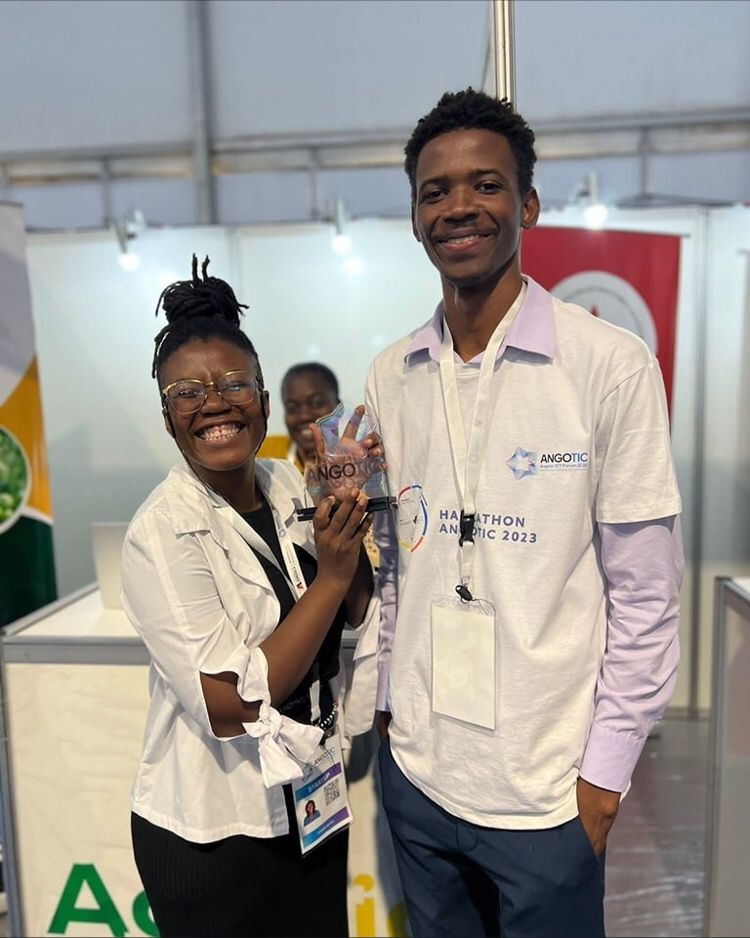
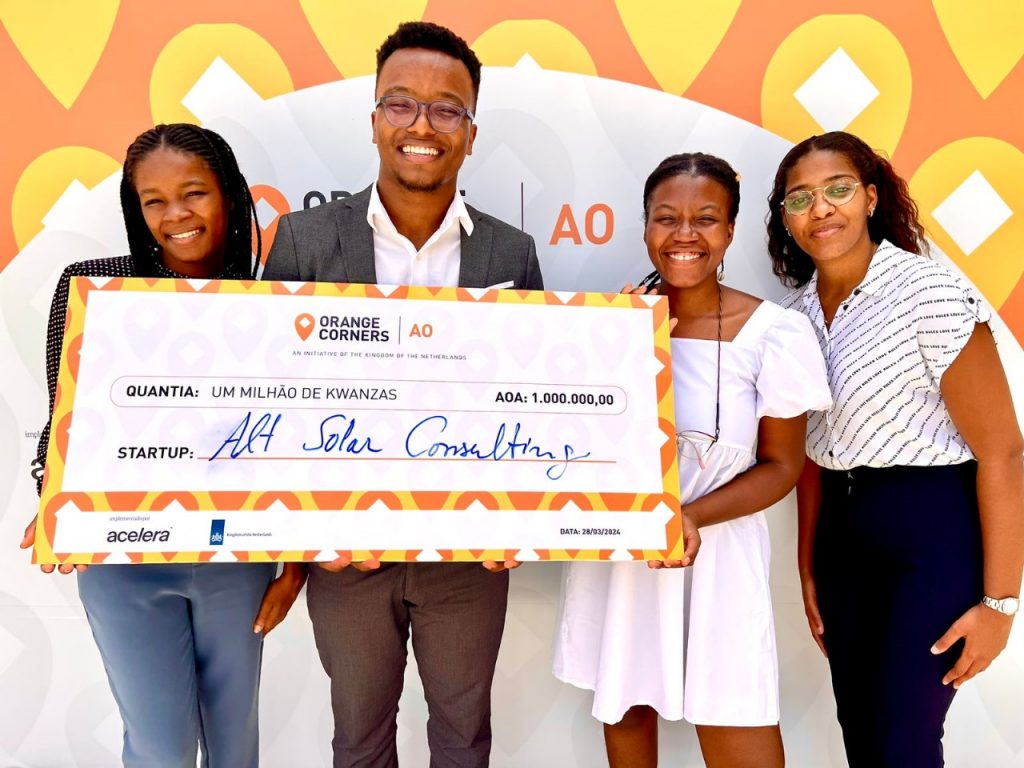
You mentioned Orange Corners. Carmen, you’ve been with Orange Corners in Angola for a while now. Can you tell us something about where we came from and where we’re going in the next few years?
Carmen: Last year our focus was to make Orange Corners Angola popular. This year we want it to be an achievement for young people. I often hear that women don’t participate because they don’t want to, but access to information about the programme means nothing when people don’t know what to do with the information they receive. We shouldn’t just say that they can submit their application, but explain what Orange Corners is, what the advantages of the programme are, and what Orange Corners can add to her life. Orange Corners is a really big programme and we have different kinds of opportunities for them. But young people must also be really interested in engaging.
Last Saturday, I went to an International Woman’s Day activity, organised by an organisation that works with girls and women in technology. And one of the startups which participated in the exhibition is also participating in Orange Corners Angola Jumpstart’s 2nd cohort. They teach children about the solar system in a playful way. Last week they did three workshops with Orange Corners, on Monday, Wednesday and Friday.. and on Saturday they were already participating in their first exhibition! This is the kind of feedback that we at Acelera Angola really appreciate: to find these people on the street, making a difference. I went to promote the third cohort that we’re starting in May, but I found something bigger than what I was looking for!
For the launch event we’re doing a fair exhibition, and they’re the first name on my list now – even if they’re not pitching, they must be there because they really learned something in our workshops and they’re applying what they learned in practice. There’s something we can buy, something we can participate in. And that’s how it should be. We want young people to say “Oh, you have an idea, you should apply for Orange Corners Angola!” If not this year, it should stay in their head, for when they’re ready to advance their idea. And while they’re with Orange Corners they’re having fun, they’re learning, and they’ll eventually make money with it – even if not immediately from the beginning!
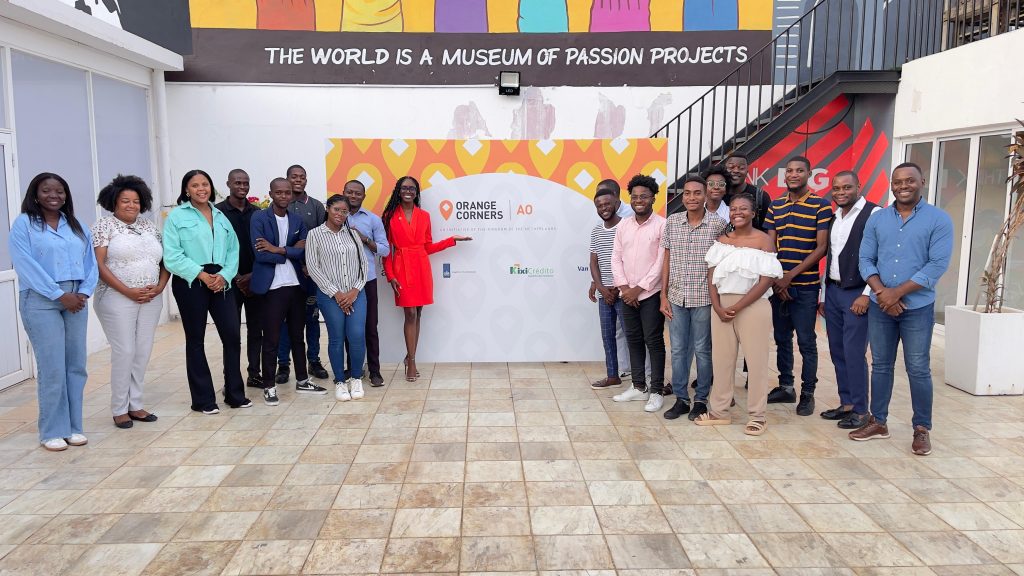
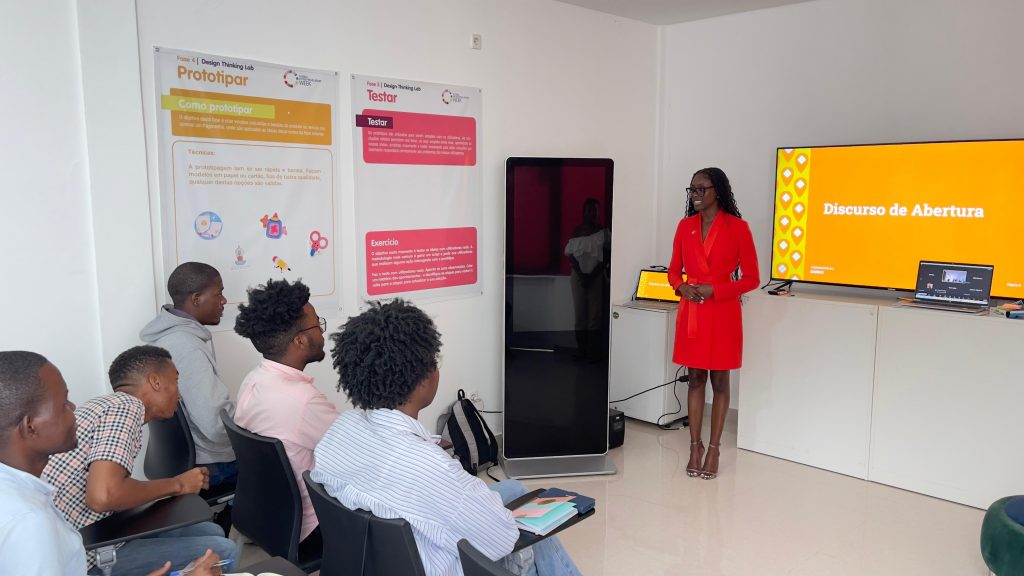
Swelia, from an embassy perspective, is there anything you’d like to add regarding your goals with Orange Corners?
Swelia: one of the first things that I noticed about Orange Corners is that it’s a programme that many others claim to have as well.. but what really sticks out is quality. I discuss this time and time again with Carmen and the team: what’s the level of quality, the methods and the knowledge that’s being passed on. I’m present at some of the workshops myself to see for myself that the methods we use are effective and innovative. Like Carmen said, last year our focus was on making Orange Corners popular among the youth and I think we’ve come a long way.
As a government-sponsored programme, we’re really doing this for one of the most essential parts of the population. And large organisations, the local government and other institutions should know about Orange Corners, because we want to encourage others to help us run the programme or do the same thing with the same level of quality. In essence, this is what the Netherlands wants to achieve with Orange Corners: a chain reaction. We pass on some of the fundamental ideas of what the Netherlands stands for through Orange Corners. It’s about self-sufficiency. It’s about being able to recognise chances, to be autonomic. All those qualities are very Dutch.
We want to achieve a chain reaction with Orange Corners.
Swelia da Silva Antonia, NL Embassy in Luanda, Angola
And finally: long-term results. What we don’t want to see is initiatives that start with all the knowledge, hyper motivated.. but then in a year they die off. Those aren’t long-term results. It’s about the long run. There’s a risk to every investment, and the majority of the people won’t make it but I still think if we do our best we can retain the knowledge, keep people interested and motivated by emphasising their exterior motives – self-help, penetrating the market economy, being able to contribute to your country. All of these things are so much bigger than just sitting in a classroom. Sometimes we can get lost in what we’re doing because of the small steps we’re taking. But at the end of the day, it’s really about what’s the vision for your life and what’s the vision for this society. So again, coming back to raison d’être. Orange Corners is an instrument that helps us get to our vision point on the horizon.
Follow Orange Corners Angola on social media:
LinkedIn
Facebook
Instagram

